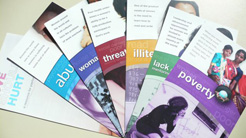It's a vicious circle. And many of the world's women are trapped in that cycle of illiteracy, overwork, abuse, ill health, lack of training and ultimately poverty. Some may view these huge, difficult problems as impossible to overcome and walk away, but Seventh-day Adventist women are finding significant ways for women to reach out to those in need.
The Women's Ministries department at the church's world headquarters re-released six brochures on March 28 that spotlight and explain the six critical issues facing women all around the world today. The brochures were unveiled to Women's Ministries leaders from the church's 13 world regions gathered at the church's world headquarters in Silver Spring, Maryland to discuss and make departmental plans for the next five years.
The plan is for these women to take a stack of these brochures back to their regions of the world church and translate and distribute them to thousands of Adventist churches around the world. These brochures are right in line with the eight problems facing the world that the United Nations has challenged both governmental and non-governmental bodies to reduce. The objectives, called Millennium Development Goals (MDGs), aim to: eradicate extreme poverty and hunger; achieve universal primary education; promote gender equality and empower women; reduce child mortality; improve maternal health; combat HIV/AIDS, malaria and other diseases; ensure environmental sustainability and develop a global partnership for development.
The reformatted brochures are more streamlined laying out the problem in clear, simple terms and encouraging women to find their own project that will make a dent in these issues affecting women.
"The church today is not the church of yesterday," said Raquel Arrais, associate Women's Ministries director. "These brochures are helping tools to get any woman started on a helping project."
Arrais says suggestions on how to get involved were gleaned from projects that women in parts of the Adventist church were already doing. "It is amazing how each church region is trying to reach people," she said.
Many of the church region directors agreed that poverty is the beginning and ending point for many of these issues that especially affect women.
"Poverty is to Africa as eggs are to chickens," said Joy Gashaija, Women's Ministries director for the Adventist Church in East-Central Africa. Gashaija spoke of how implementing a 3-year literacy program in Uganda starting in 2002 was an important step in stopping the cycle of poverty.
"Women who took the course can now count money and read and so are not easily cheated," she said. "And with a little education they can also learn about health and how to prevent diseases. And once they've learned a little more they may get the courage to share that knowledge with others."
Gashaija said everyone working together made the program successful. "Some people donated books, or pencils, and some were willing to teach the courses for free."
Evelyn Nagel, a Women's Ministries director for the church in South America said women in her region run a similar literacy program in her region. She added that abuse, which is the focus of one brochure, is often thought of as just a women's issue. However her department is very focused on educating everyone about the issue.
"Our 'Breaking the Silence' program uses magazines, radio and television broadcasts on the Hope Channel to bring awareness to the issue," Nagel said. "We work with all levels of the church on abuse prevention. This year we are doing a television show that will teach children how to deal with abuse."
"I like the focus on ministry, it encourages us to reach out. It is more than just reading it and say 'so what, what can I do?'" said Sally Lam-Phoon, Women's Ministries director for the Northern Asia Pacific region of the church. "We must ask ourselves everyday what does God want me to do? This is what the brochure is about. As a women ministries leader my goal is where God is working so I can join him," she added. [Editor: Taashi Rowe for ANN/APD]

